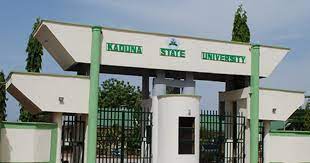Nestled in the heart of Kaduna, Kaduna State, Nigeria, Kaduna State University (KASU) is a shining testament to the pursuit of academic excellence.
Established in 2004, this esteemed public university has earned its place as a hub of knowledge and learning.
In this detailed exploration, I’ll uncover the various facets that make KASU a premier choice for students seeking a top-notch education.
See Kaduna State University Courses Offered

Campuses and Faculties
KASU boasts two distinct campuses, each contributing to the diverse academic landscape of the institution:
1. Main Campus in Kaduna
This is the primary hub of academic activities, where students engage in a wide range of programs and experiences.
2. Satellite Campus in Kafanchan
Located in Kafanchan, this satellite campus provides additional opportunities for learning, ensuring that education reaches every corner of Kaduna State.
KASU is organized into seven faculties, each offering specialized programs that cater to various academic interests:
- Faculty of Arts
- Faculty of Education
- Faculty of Engineering
- Faculty of Environmental Sciences
- Faculty of Law
- Faculty of Management Sciences
- Faculty of Medicine and Health Sciences
- Faculty of Science
Comprehensive Academic Offerings
KASU’s commitment to holistic education is reflected in its diverse range of programs, which encompass both undergraduate and postgraduate studies.
Whether you aspire to delve into the arts, sciences, law, or management, KASU provides a platform to nurture your intellectual curiosity.
Additionally, KASU caters to the needs of working professionals and part-time students through its School of Continuing Education.
This institution offers part-time degree programs, ensuring that education remains accessible to those with busy schedules.
Entry Requirements and Strike Status
For prospective students seeking admission to KASU, the JAMB cut-off mark for the stands at 140.
It’s essential to keep in mind that KASU is currently not on strike, ensuring that your academic journey proceeds without disruptions.
Notable Alumni
KASU takes pride in its illustrious alumni who have made significant contributions to society.
Some of the distinguished graduates include:
- Mukhtar Ramalan Yero: Former Governor of Kaduna State
- Hadiza Bala Usman: Managing Director of the Nigerian National Petroleum Corporation
- Sani Musa: Senator representing Niger East Senatorial District
- Fatimah Binta Muhammad: Executive Director of the Kaduna State Primary Health Care Development Agency
Reputation for Academic Excellence
KASU’s reputation as a center for academic excellence is well-founded.
The university has consistently upheld high standards of education and research, making it a preferred choice for students seeking quality education in Nigeria.
KASU’s commitment to nurturing talent, fostering innovation, and producing well-rounded graduates is evident in its track record of success.
Explore KASU
To learn more about Kaduna State University and explore its offerings, you can visit their official website here.
For admissions-related information, the admission portal is accessible here, and current students can access their portal Here.
Kaduna State University, with its rich history, commitment to excellence, and diverse academic offerings, stands as a beacon of quality education in Nigeria.
Whether you are a prospective student or an academic enthusiast, KASU opens doors to a world of knowledge and opportunities.
Join the KASU community today and embark on a journey of intellectual growth and personal development.
Your path to a brighter future starts here.
See ABU Courses Offered – List of Ahmadu Bello University (ABU)
School Fees at a Glance
It’s essential for prospective students to have a clear understanding of the current school fees at Kaduna State University (KASU).
These fees are designed to ensure that quality education remains accessible to all.
As of now, the school fees for KASU students are as follows:
- Undergraduate: N105,000 per session
- Postgraduate: N150,000 per session
Notably, these fees were reduced by a significant 30% in August 2023, thanks to the proactive measures taken by the state government.
Previously, undergraduate fees stood at N150,000, and postgraduate fees were N200,000 per session.
To facilitate payment, the school fees at KASU are divided into two installments:
- The first installment is due at the beginning of the session.
- The second installment is payable in the middle of the session.
In addition to the tuition fees, students may also be required to pay some additional fees, including:
- Examination fee: N5,000
- Library fee: N2,000
- Health insurance fee: N1,000
For more detailed information about the school fees and their breakdown, you can visit the official KASU website.
Admission Requirements and Process
Now that you have an insight into the school fees, let’s delve into the admission requirements and the application process for KASU.
Admission Requirements
To be eligible for admission to KASU, you must meet the following requirements:
- O-Level Credit Passes: You must have at least five (5) credit passes in your O-Level results, including Mathematics and English Language. These credits should be obtained at not more than two sittings.
- JAMB UTME Score: A good score in the JAMB Unified Tertiary Matriculation Examination (UTME) is crucial for admission to KASU. Your JAMB score serves as a significant determinant of eligibility.
- KASU Entrance Examination: Applicants must also pass the KASU entrance examination. This examination evaluates your knowledge and readiness for higher education.
Application Process
Here’s a step-by-step guide to the application process for KASU:
- Visit KASU Website: Start by visiting the official KASU website. There, you can access the necessary forms and information.
- Download Application Form: Download the application form from the website.
- Form Submission: Fill out the application form thoroughly, ensuring all required information is provided accurately. Attach the necessary documents as specified.
- Payment of Application Fee: Pay the application fee of N2,000 as part of the application process.
- Entrance Examination: Prepare for and take the KASU entrance examination, typically held in June or July each year. Results are typically released in August.
Once you’ve successfully navigated the admission process and secured a spot at KASU, there are a few more financial considerations:
- Acceptance Fee: After admission, you’ll need to pay an acceptance fee of N10,000 to confirm your enrollment.
- Course Registration: Register for your chosen courses as per the university’s guidelines.
- Tuition Fees: Ensure that you pay the tuition fees in accordance with the specified deadlines.
See KASU Cut Off Mark For all Courses
here’s the information presented in a tabular form for easier reference:
| School Fees at a Glance | |
|---|---|
| Current School Fees (2023) | |
| Undergraduate: N105,000 per session | |
| Postgraduate: N150,000 per session | |
| Previous School Fees (Before August 2023) | |
| Undergraduate: N150,000 per session (Reduced by 30%) | |
| Postgraduate: N200,000 per session (Reduced by 30%) | |
| Payment Structure | |
| Tuition fees are divided into two installments: | |
| 1. The first installment is due at the beginning of the session. | |
| 2. The second installment is payable in the middle of the session. | |
| Additional Fees (if applicable) | |
| Examination fee: N5,000 | |
| Library fee: N2,000 | |
| Health insurance fee: N1,000 | |
| Admission Requirements and Process | |
| Admission Requirements | |
| – O-Level Credit Passes (Minimum 5 credits, including Mathematics and English Language) | |
| – A good JAMB UTME Score | |
| – Successful completion of the KASU entrance examination | |
| Application Process | |
| 1. Visit KASU Website: | Start by visiting the official KASU website for forms and information. |
| 2. Download Application Form: | Download the application form from the website. |
| 3. Form Submission: | Fill out the application form accurately and attach required documents. |
| 4. Payment of Application Fee: | Pay the N2,000 application fee as part of the application process. |
| 5. Entrance Examination: | Prepare for and participate in the KASU entrance examination (June/July). Results are usually released in August. |
| After Admission | |
| – Pay the Acceptance Fee: N10,000 to confirm enrollment. | |
| – Register for Courses according to university guidelines. | |
| – Ensure prompt payment of tuition fees as per specified deadlines. | |
| Note: KASU is committed to academic excellence and affordable education. |
See List Of Universities That Accept 140 Cut Off Mark
See JAMB CBT Centers Approved for Registration in Kaduna State
Conclusion
By following these steps and meeting the admission requirements, you can embark on your educational journey at KASU and experience quality education in Kaduna, Nigeria.
Remember that KASU is not only committed to academic excellence but also to making education affordable and accessible for all.
SEE ALSO:
Ignatius Ajuru University of Education School Fees
Ibrahim Badamasi Babangida University School Fees
Top 3 Sponsorship Programs For Jobs For Foreigners in 2023/2024






